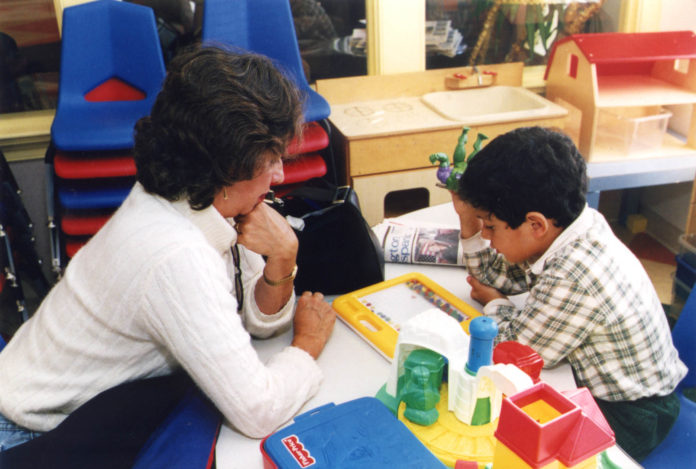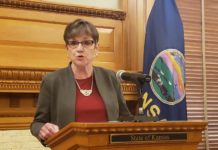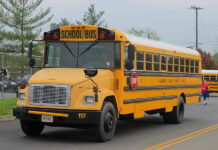Public education advocates on Friday prevailed in their efforts to sideline a broad education bill they said would benefit private schools at the expense of a state-funded public education.
The Senate deadlocked at 20, falling one vote short of passing the bill, which paired the state education budget with other measures intended to give the parents of struggling students more choice about where their children can go to school.
“Clearly, the saga is not over,” said Mark Tallman, lobbyist for the Kansas Association of School Boards.
“We’re still back in the situation of having to find what is necessary to pass an appropriate budget, in our view, that doesn’t have damaging parts with it.”
Dubbed derisively by Democrats as “Frankenstein,” the bill contained Gov. Laura Kelly’s plan to spend $5.2 billion on public education for the 2021-22 school year, which is in line with the state Supreme Court’s order to adequately fund schools.
However, the budget was rolled together with two programs providing subsidies for at-risk students to attend a private school either with scholarships backed with tax credits or allowing them to use the state’s base allocation for them to attend private schools.
The bill also included another measure that would have reduced state aid for students for who attended school remotely for an extended period of time, a response to the pandemic where students were forced out of the classroom for months.
The bill had already appeared to be in danger late Thursday night when the Senate deadlocked at 19 on the bill with embattled Senate Majority Leader Gene Suellentrop and state Sen. John Doll absent.
Both returned to the chamber on Friday and voted, but the bill lost ground when Republican state Sen. Rob Olson changed his vote from “yes” to “no.”
Olson wouldn’t explain his change of heart from 24 hours earlier but Senate President Ty Masterson accused him of playing political games.
“The senator from Johnson played a game,” Masterson said of Olson.
“He didn’t discuss that with anybody. He just did it,” Masterson said.
“We control what we can control,” he said. “I think it’s unfortunate that he voted against school funding and against poor kids, but that was his choice.”
Some senators thought there were an array of issues that conspired to defeat a bill that included different elements such as school spending, education policy, and tax credits.
“This bill bundled everything together,” said Democratic state Sen. Pat Pettey of Kansas City.
“It put the finance piece in with not only a tax credit piece but a voucher piece as well,” Pettey said.
The bill got harder to justify, she said, because of the demands it would have placed on the treasurer’s office to run a new program that would have allowed at-risk students to take their base state aid with them to a private school.
The treasurer estimated it woud have cost at least $374,750 a year to hire five new full-time employees to run what is known as an educational savings account program.
Supporters of the bill took exception to the cost estimate, saying it didn’t consider that there were third-parties that could handle those duties.
Republican Sen. Jeff Longbine of Emporia said public education advocates were effective at lobbying against the two components of the bill that have been criticized as “vouchers.”
The bill would have expanded a program that gives up to $10 million a year in state tax credits to entice businesses and individuals to donate money to a scholarship program for private schools.
Another provision created the education saving accounts, which would allow at-risk students attending public schools to take their state base aid – about $4,500 a year – to a private school accredited by the state Board of Education or a national or regional accrediting agency.
Students eligible for the program would have included those who have a high rate of absenteeism, are homeless, are not meeting requirements for graduation or are performing below grade level, among other factors.
Pettey called the education savings accounts a “full-blown voucher,” an issue that public education advocates lobbied on.
“The vouchers continue to be very, very controversial with most people,” Longbine said.
“There was a very strong concerted effort from public schools about vouchers,” he said.
“We received literally hundreds of emails about the dangers of vouchers and the deterioration of public education,” he said.
“I think that’s what most people felt uneasy about.”
Republican state Rep. Renee Erickson of Wichita said supporters of the bill expected an energetic effort to portray the bill as vouchers that would take money away from public schools.
“We’ve seen that many, many times before and we knew that would happen,” Erickson said.
“We were just hopeful that we would be able to overcome that this time and, unfortunately, we fell short, but we’re not going to give up,” she said.
“We’re going to keep going because it’s worth it for our kids.”
The bill that failed to pass started in the House where it’s lead architect was Republican state Rep. Kristey Williams of Augusta who chairs the K-12 Education Budget Committee.
Williams showed little inclination about breaking the bill into parts in order to get them passed and signed into law.
“From my perspective, policy and funding should always go together,” Williams said.
“There is not a scenario where I would want to just spend almost $6 billion out the door without having some accountability,” she said.
“Funding and policy,” she said, “should go hand in hand.”
















